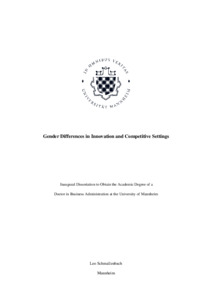|
Gender differences in innovation and competitive settings
Schmallenbach, Leo
![[img]](https://madoc.bib.uni-mannheim.de/63563/1.hassmallThumbnailVersion/Dissertation_Schmallenbach.pdf)  Vorschau |
|
PDF
Dissertation_Schmallenbach.pdf
- Veröffentlichte Version
Download (4MB)
|
|
URN:
|
urn:nbn:de:bsz:180-madoc-635638
|
|
Dokumenttyp:
|
Dissertation
|
|
Erscheinungsjahr:
|
2022
|
|
Ort der Veröffentlichung:
|
Mannheim
|
|
Hochschule:
|
Universität Mannheim
|
|
Gutachter:
|
Hoisl, Karin
|
|
Sprache der Veröffentlichung:
|
Englisch
|
|
Einrichtung:
|
Fakultät für Betriebswirtschaftslehre > Organisation und Innovation (Hoisl 2015-)
|
|
Fachgebiet:
|
330 Wirtschaft
|
|
Freie Schlagwörter (Englisch):
|
gender differences , competition , innovation , top performers
|
|
Abstract:
|
This dissertation adds to the growing body of literature at the intersection of economic sociology and psychology on how gender differences shape outcomes, by putting the spotlight on women and men top performers in competitive settings. It is particularly important to look at gender differences and their effects on outcomes in these settings for three reasons. First, top performers contribute disproportionately to value creation, economic growth, and innovation, implying a strong lever for gender differences to materialize. Second, it remains to be understood whether gender differences that have been indicated for the general population also apply to men and women in these specific settings. Third, due to the underrepresentation of women in the most competitive segments of the labor market, there is an unmet need for large-scale empirical evidence. In combination with the first two points, this evidence is important to not only understand drivers and antecedents of the prevailing gender gap in competitive settings, but also to highlight the gendered potential in human capital that is likely foregone. This evidence can help to derive and articulate countermeasures aimed at increasing the representation of women in such settings.
In three separate chapters, this thesis aims to advance our understanding of how gender differences shape outcomes in innovation and competitive settings by answering three distinct questions:
1) How do gendered evaluations of top performers spillover to their protégés in a mentor-protégé relationship?
2) How do gender differences between star inventors impact innovation outcomes in inventor teams?
3) How do gender differences moderate the influence of pressure on performance of extreme precision tasks?
|
 | Dieser Eintrag ist Teil der Universitätsbibliographie. |
 | Das Dokument wird vom Publikationsserver der Universitätsbibliothek Mannheim bereitgestellt. |
 Suche Autoren in Suche Autoren in
Sie haben einen Fehler gefunden? Teilen Sie uns Ihren Korrekturwunsch bitte hier mit: E-Mail
Actions (login required)
 |
Eintrag anzeigen |
|
|
 ORCID: 0000-0001-5302-2578
ORCID: 0000-0001-5302-2578






 Suche Autoren in
Suche Autoren in